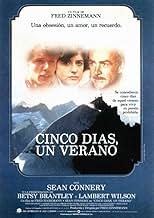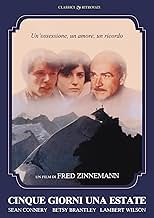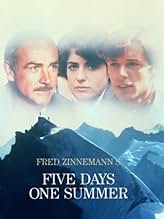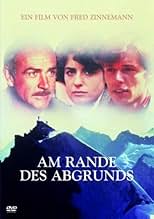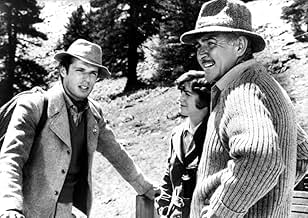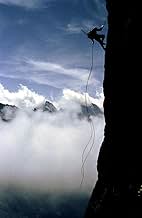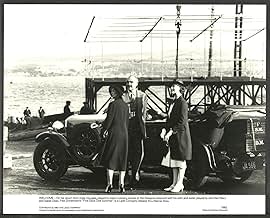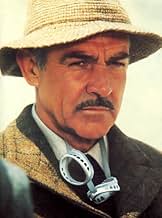NOTE IMDb
6,1/10
1,4 k
MA NOTE
Ajouter une intrigue dans votre langueAn aging doctor takes his beautiful young mistress on an alpine walking holiday only to find that she is falling for the charms of a dashing tour guide, but there is a dark secret that looms... Tout lireAn aging doctor takes his beautiful young mistress on an alpine walking holiday only to find that she is falling for the charms of a dashing tour guide, but there is a dark secret that looms over the couple.An aging doctor takes his beautiful young mistress on an alpine walking holiday only to find that she is falling for the charms of a dashing tour guide, but there is a dark secret that looms over the couple.
- Réalisation
- Scénario
- Casting principal
Jerry Brouer
- Van Royen
- (as Jerry Brouwer)
Avis à la une
This final Fred Zinnemann film was pretty much trashed by the critics when it came out in 1983 which is puzzling, in my opinion. I mean, it's certainly not a great or even very good film but it's just as good or better than a lot of the stuff DePalma was churning out at the same time over which the same critics swooned. Of course, by 1983 Zinnemann was long out of favor with the auteurists who dominated film criticism, having been consigned to the realm of "impersonality" by their hero and mentor, Andrew Sarris who, as usual, confused moral earnestness and craftsmanship with anonymity, as if Zinnemann were no better than, say, Robert Z. Leonard. Or Delbert Mann.
So let me do my small part to mildly rehabilitate this sad tale of a love affair crumbling amid the Alps that could have been told by Hemingway, Irwin Shaw or James Salter. Problem is that scenarist Michael Austin is considerably less talented than those three scribes and makes the fatal mistake, I'm sure with Zinnemann's input, of having the affair be between uncle and niece, thus giving the proceedings an un-needed "yuck!" factor when the story could have worked just as easily or better as older man/younger woman.
If, however, you can overlook the above failing (a tall ask, judging by the IMDB responses below) there are many things that are appealing in this good director's swan song, including fine performances by the three leads, especially the too seldom seen Betsy Brantley who imbues her character with poignancy, intelligence and grace. I also liked the story within the story of the old woman who gazes upon the perfectly ice-preserved body of the handsome young man she was to marry forty years ago. A lot of film makers would have stuck this in awkwardly as a clunky, moralistic sub plot. Not Zinnemann. In his hands it is woven seamlessly into the movie's fabric and does not hit you over the head with "message" about true versus false love.
Then there is the lovely score by Elmer Bernstein, and the even lovelier cinematography of Giuseppe Rotunno.
Bottom line: Sarris was wrong about Huston and Wilder. I maintain he's almost as wrong about Zinnemann. Give it a B minus.
So let me do my small part to mildly rehabilitate this sad tale of a love affair crumbling amid the Alps that could have been told by Hemingway, Irwin Shaw or James Salter. Problem is that scenarist Michael Austin is considerably less talented than those three scribes and makes the fatal mistake, I'm sure with Zinnemann's input, of having the affair be between uncle and niece, thus giving the proceedings an un-needed "yuck!" factor when the story could have worked just as easily or better as older man/younger woman.
If, however, you can overlook the above failing (a tall ask, judging by the IMDB responses below) there are many things that are appealing in this good director's swan song, including fine performances by the three leads, especially the too seldom seen Betsy Brantley who imbues her character with poignancy, intelligence and grace. I also liked the story within the story of the old woman who gazes upon the perfectly ice-preserved body of the handsome young man she was to marry forty years ago. A lot of film makers would have stuck this in awkwardly as a clunky, moralistic sub plot. Not Zinnemann. In his hands it is woven seamlessly into the movie's fabric and does not hit you over the head with "message" about true versus false love.
Then there is the lovely score by Elmer Bernstein, and the even lovelier cinematography of Giuseppe Rotunno.
Bottom line: Sarris was wrong about Huston and Wilder. I maintain he's almost as wrong about Zinnemann. Give it a B minus.
Five Days One Summer (1982)
Plot In A Paragraph: A middle aged Scottish doctor (Connery) and a younger woman (Betsy Brantley) go on a climbing holiday in the Swiss alps, when their Swiss tour guide takes a liking to the woman.
Director Fred Zinnemann's movie deserves to be much better known than it is. It is beautifully shot, has great locations and is well acted. I think I know why audiences stayed away like they did.
It seemed at first that the couple were father and daughter, then it seemed as if they were on their honeymoon (as the doctor was introducing the young woman as his wife) finally, it was revealed they wear in fact uncle and niece, and they were having an incestuous affair. Not your usual love story. And it plays like a big television drama, lots of unnecessary flashbacks and a very melodramatic ending, and there isn't really a lot of dialogue either!! Long periods of time go by without a line of dialogue being spoken.
Another Connery movie I paid a lot of money to buy on DVD, however this one is worth watching (unlike a few of the others I purchased without seeing) a perfectly fine lazy Sunday afternoon movie.
Budgeted at $15 million, Five Days One Summer grossed under $200,000 at the domestic box office. Zimmerman was so upset by the movies failure and the awful reviews, that he never directed another movie again.
Plot In A Paragraph: A middle aged Scottish doctor (Connery) and a younger woman (Betsy Brantley) go on a climbing holiday in the Swiss alps, when their Swiss tour guide takes a liking to the woman.
Director Fred Zinnemann's movie deserves to be much better known than it is. It is beautifully shot, has great locations and is well acted. I think I know why audiences stayed away like they did.
It seemed at first that the couple were father and daughter, then it seemed as if they were on their honeymoon (as the doctor was introducing the young woman as his wife) finally, it was revealed they wear in fact uncle and niece, and they were having an incestuous affair. Not your usual love story. And it plays like a big television drama, lots of unnecessary flashbacks and a very melodramatic ending, and there isn't really a lot of dialogue either!! Long periods of time go by without a line of dialogue being spoken.
Another Connery movie I paid a lot of money to buy on DVD, however this one is worth watching (unlike a few of the others I purchased without seeing) a perfectly fine lazy Sunday afternoon movie.
Budgeted at $15 million, Five Days One Summer grossed under $200,000 at the domestic box office. Zimmerman was so upset by the movies failure and the awful reviews, that he never directed another movie again.
In general this last film of the director Fred Zinnemann has not met with much approval, and it is not difficult to see why. The plot is extremely simple, whatever tension is established towards the end is soon dissipated; and the emotional tensions between the leads are not fully resolved. The scenery is nice; the climbing scenes interesting or scary according to one's inclinations; but overall it is not surprising that some people have ended a viewing by saying 'Is that it?'
I still find it worth watching again after many years in the reissued Warner archive version, and not only for Betsy Brantley's big blue eyes - for example, there is a chance for Sean Connery to show more emotional range than usual in his roles, and the period detail has a good authentic feel of the 1930s.
I still find it worth watching again after many years in the reissued Warner archive version, and not only for Betsy Brantley's big blue eyes - for example, there is a chance for Sean Connery to show more emotional range than usual in his roles, and the period detail has a good authentic feel of the 1930s.
The good points - beautiful scenery, and some viewers might appreciate the insight into mountain climbing in the 1930's.
Bad points - the flashbacks are tedious, the ending obvious (to this viewer anyway)and - apart from Connery, who plays himself, as always - the acting uninvolving. And personally I don't care much about mountaineering in the 1930's, and this film didn't do anything to quicken my interest.
There are some surprises, but I feel the movie really lacks from characters whom one can care about: in particular Betsy Brantley, who plays Kate, seems desperately out of her depth here.
I found it to be pretentious and glacially slow. I'd rather have that ninety minutes of my life back.
Bad points - the flashbacks are tedious, the ending obvious (to this viewer anyway)and - apart from Connery, who plays himself, as always - the acting uninvolving. And personally I don't care much about mountaineering in the 1930's, and this film didn't do anything to quicken my interest.
There are some surprises, but I feel the movie really lacks from characters whom one can care about: in particular Betsy Brantley, who plays Kate, seems desperately out of her depth here.
I found it to be pretentious and glacially slow. I'd rather have that ninety minutes of my life back.
This movie is dated and overly dramatic, but it also has its charms. The best part about it is the accurate portrayal of Swiss culture (yeah it does kind of exist, mostly mountain climbing and rigid traditions, but the occasional alphorn and yodle). Really, it is frighteningly accurate. Beautiful mountain scenery and discovering how old-school climbing gear worked are two of the other benefits of this surprisingly sweet movie.
Le saviez-vous
- AnecdotesSir Sean Connery once described this movie's location work as "the most audacious piece of filmmaking I've ever been involved in. It was film production at the point of pioneering." Connery once recounted the worst moment he experienced while making this movie. Connery had to make a three hundred meter (three hundred twenty-eight yard) walk alone down a glacier known to be laden with crevasses hidden by a fresh snowfall and without safety markers. The marker poles were present during rehearsals, but were not there during filming, as they would be seen in the shot. Connery said, "Inches on either side of the path there were ninety foot caverns. I could hear the sound of ice moving underneath me, and behind me in the peaks, shifting all the time. That's the loneliest walk I've ever taken."
- Versions alternativesFred Zinnemann edited 11 minutes from this film for its 1987 CBS television network premiere.
- ConnexionsReferenced in La valse des pantins (1982)
- Bandes originalesAlexander's Ragtime Band
Composed by Irving Berlin
Meilleurs choix
Connectez-vous pour évaluer et suivre la liste de favoris afin de recevoir des recommandations personnalisées
- How long is Five Days One Summer?Alimenté par Alexa
Détails
- Date de sortie
- Pays d’origine
- Site officiel
- Langues
- Aussi connu sous le nom de
- Five Days One Spring
- Lieux de tournage
- Sociétés de production
- Voir plus de crédits d'entreprise sur IMDbPro
Box-office
- Budget
- 17 000 000 $US (estimé)
- Montant brut aux États-Unis et au Canada
- 199 078 $US
- Week-end de sortie aux États-Unis et au Canada
- 43 891 $US
- 14 nov. 1982
- Montant brut mondial
- 199 078 $US
Contribuer à cette page
Suggérer une modification ou ajouter du contenu manquant


